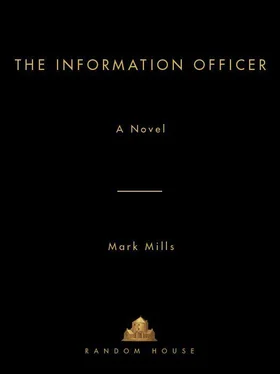Mark Mills - The Information Officer
Здесь есть возможность читать онлайн «Mark Mills - The Information Officer» — ознакомительный отрывок электронной книги совершенно бесплатно, а после прочтения отрывка купить полную версию. В некоторых случаях можно слушать аудио, скачать через торрент в формате fb2 и присутствует краткое содержание. Жанр: Старинная литература, на русском языке. Описание произведения, (предисловие) а так же отзывы посетителей доступны на портале библиотеки ЛибКат.
- Название:The Information Officer
- Автор:
- Жанр:
- Год:неизвестен
- ISBN:нет данных
- Рейтинг книги:5 / 5. Голосов: 1
-
Избранное:Добавить в избранное
- Отзывы:
-
Ваша оценка:
- 100
- 1
- 2
- 3
- 4
- 5
The Information Officer: краткое содержание, описание и аннотация
Предлагаем к чтению аннотацию, описание, краткое содержание или предисловие (зависит от того, что написал сам автор книги «The Information Officer»). Если вы не нашли необходимую информацию о книге — напишите в комментариях, мы постараемся отыскать её.
The Information Officer — читать онлайн ознакомительный отрывок
Ниже представлен текст книги, разбитый по страницам. Система сохранения места последней прочитанной страницы, позволяет с удобством читать онлайн бесплатно книгу «The Information Officer», без необходимости каждый раз заново искать на чём Вы остановились. Поставьте закладку, и сможете в любой момент перейти на страницу, на которой закончили чтение.
Интервал:
Закладка:
It was a while before he was able to bring any order to bear in his head. Something about the meeting had struck a false note at the time, and he now realized what it was. Assuming that they’d learned of Max’s interest in the deaths from Iris, then there was no way they could have known about the shoulder tab. But if that was the case, then what were the two mystery men doing at the meeting? They had the distinct whiff of military intelligence about them—hardly the types to get involved in such an affair, not unless they knew there was more at stake than just a couple of local girls dying in what might or might not be suspicious circumstances.
Colonel Gifford, on the other hand, had appeared genuinely shocked when presented with the shoulder tab. His face had betrayed all the signs of someone coming to terms with the dire ramifications of such a discovery.
So what was going on? Colonel Gifford was in the dark while the others knew more than they were letting on? And where did Elliott fit? In one or other of the camps, or somewhere in between?
The questions kept proliferating, and Max was beginning to wish he’d taken Elliott up on his offer of barbecued fish, burgundy, and a heart-to-heart, when the steady wail of the “Raiders Passed” siren sounded outside.
He took himself up to the roof, where he smoked a cigarette and watched the dense pall of dust hanging over Ta’ Qali slowly disperse on the breeze.
Down below in the courtyard a fretful Father Bilocca was doing his best to marshal a bunch of boys into an ordered line, oblivious to the obscene gestures and the faces being pulled whenever his back was turned.
“Is everything okay, sir?”
Max hadn’t heard Pemberton join him.
“Fine. Just dandy. Smoke?”
Pemberton took a cigarette, and Max lit it for him.
“I hear Rosamund came up trumps.”
“She certainly did. I even have my own bathroom, not that there’s any water in the pipes.”
Rosamund had found him digs in Saint Julian’s, living with the Copnalls. Their eighteen-year-old daughter, Elizabeth, was a pale and pretty creature prone to blushing who worked in the naval cipher department at Fort Saint Angelo. Max could picture her state of agitation at having Pemberton living under the same roof. The same thought must surely have occurred to Rosamund.
“How’s Elizabeth?”
“She’s a fine pianist.”
It all sounded very Jane Austen: the daughter tickling the ivories for the benefit of the handsome house guest. Rosamund was definitely up to something, but he couldn’t see it yet.
“I had a shot at that piece for the Weekly Bulletin.”
Max took the sheet of typed text. “That was quick.”
“It probably shows.”
He was clearly eager for Max to cast an eye over it there and then.
“The length looks good. I’ll let you know.”
For want of anything better to do, he started to read the moment Pemberton had disappeared back down the stairwell.
He read it twice, trying to find fault with it, something, anything. The tone was spot on, muscular and defiant yet not too triumphalist. He didn’t play to the heroism of the Manchester boys working the Bofors gun—that spoke for itself—rather, he presented the young gunners as workers at the coal face, grinding out a slow but inexorable victory. The mining metaphor was a small stroke of genius. It resonated with danger and hardship and collective enterprise, and it carried with it the shared experience of a people who daily descended into the earth. The theme also permitted him to round off the piece with a comic touch. There were no coal mines on Malta, a detail that seemed to have escaped the notice of the Italians, who in the early days of the conflict had proudly announced the destruction of a Maltese coal mine by the Regia Aeronautica—still the cause of much hilarity across the island.
Pemberton had done well, more than well; the article was pitch-perfect. So why, then, did it leave Max cold? A few hours before, it would have had him racing downstairs to congratulate the author.
Pemberton would get his pat on the back, and the piece would go out in the Weekly Bulletin , but Max would know it for what it was: another lie peddled to the masses. They weren’t one happy family pulling together in adversity. His experience at the Cassars’ house had made that starkly clear to him.
He remembered something that Charles Headley, his former boss and mentor, had said to him soon after his arrival at the Information Office.
“You know what the great thing about our line of work is, old man? I’ll tell you, it’s very simple. A lie can make its way halfway round the world before the truth has a chance to put its boots on.”
There was probably no less truth in those words now than there had been at the time, but for once Max found himself calling into question the words’ central assumption—that the power of a lie was something to be admired and cherished.
How much angrier would those grieving women at the Cassars’ have been with him had they known the truth about Carmela’s death? The answer, he suspected, was that they would have been less angry.
Thanks to Lilian, he knew the Maltese well enough by now to say that they would at least have respected him for his honesty. They were an ancient people, a wise people. They had seen civilizations come and go around their island home, and yet they were still there, as they would always be, with their wry humor, their rough savoir faire, and their burning faith. Max and his kind were simply passing through. Maybe their hosts deserved a little more credit, a little more respect.
He could see where he was going with this, and he knew the reason why. He had just been insulted, intimidated, threatened with court-martial, even blackmailed. More than anything, it was the blackmail that angered him. Exploiting his friendship with Lilian to keep him in line was about as low as it got. So much for the happy family.
Feeling his hackles rising again, he lit another cigarette and did something he hadn’t done in a long while when caught in a quandary: he asked himself what his father’s advice would be to him.
The sun was at its zenith, and the heat rising in waves from the zinc roof was almost unbearable, but a small chill ran the length of Max’s spine when the answer came to him.
The town of Mtarfa lay scattered along the ridge just north of Mdina, its skyline dominated by the austere military architecture of the 90th General Hospital. The sprawling complex of wards and accommodation blocks had consumed the army barracks nearby to offer more than a thousand beds to the sick and wounded.
An attractive Maltese VAD eventually tracked Freddie down to the burns ward. Infection was a problem, apparently, and she asked Max to wait outside. He was quite happy to oblige. The few glimpses he got through the swing-doors as nurses came and went were enough of a trial. Some of the patients were so swaddled in bandages that they looked like Egyptian mummies laid out in state. Others were having their fresh burns scrubbed and sprayed, their eyes irrigated, or old dressings changed. There seemed to be so much activity, all of it centered on flesh that was either red raw or black and encrusted. The sweet smell of ether carried through the doors, along with a low murmur of morphine-dulled pain.
When Freddie finally appeared, they made for the long terrace at the back of the building. It had a grandstand view of the hills to the north and would normally have been thronging with invalids of all varieties making the most of the low, late sunshine, but people had grown more wary since the targeted raid on the 39th General Hospital at Saint Andrew’s.
It was the first chance Max and Freddie had had to talk openly about the meeting that morning, and Freddie didn’t hang about.
Читать дальшеИнтервал:
Закладка:
Похожие книги на «The Information Officer»
Представляем Вашему вниманию похожие книги на «The Information Officer» списком для выбора. Мы отобрали схожую по названию и смыслу литературу в надежде предоставить читателям больше вариантов отыскать новые, интересные, ещё непрочитанные произведения.
Обсуждение, отзывы о книге «The Information Officer» и просто собственные мнения читателей. Оставьте ваши комментарии, напишите, что Вы думаете о произведении, его смысле или главных героях. Укажите что конкретно понравилось, а что нет, и почему Вы так считаете.










